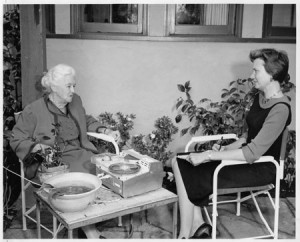
“Imagine listening to an elderly relative tell of her journey to America as an immigrant, her arrival at Ellis Island, and her first job in a clothing factory. Or imagine another family member describing how he worked on the family farm, learned to read in a one-room school house, and courted his wife at church socials. Such are the opportunities available to the family historian who draws upon the method of oral history.” So begins Linda Shopes’s poignant essay “Using Oral History for a Family History Project.” As Shopes movingly points out, oral histories are among the most useful and satisfying methods of compiling family histories.
Importance of Oral History
Shopes further notes that oral histories, the information gathered from interviews and discussions, “can yield information about motives and attitudes and the ‘feeling tone’ that even the most extensive genealogical reconstruction lacks.” While genealogical research using public documents and printed sources on one’s family may provide facts and even moderate insight into the daily life of your ancestors, conducting oral history projects provides significant information that these sources might lack. Perhaps most importantly, Shopes points out that conducting oral histories can act as a means of developing or strengthening family relationships.[1]
In Presenting Oral History, Donald A. Ritchie suggests that oral history interviews can help by providing not only ‘who’ and ‘what,’ but also the ‘why.’[2] Understanding motives, beliefs, and events through the eyes of an ancestor can lead to a more expansive account and allow family historians to feel as though they were present for these moments in time.
Preparing to Conduct Interviews
Before conducting interviews with family members, it is strongly recommended that you conduct preliminary research on your subject. While Shopes recommends examining a family bible (if one is available), other good places to search include family heirlooms and other material objects as well as public records and documents.[3] Crucial to the oral history process is to place individuals within a broader context of the historical era in which they lived. It is advisable for the interviewer to spend time researching not only American history during the period you plan to discuss, but also local history of the location where the subject lived.[4]
In order to avoid gathering a disconnected series of facts, dates, and names, it is also important to determine the focus of an interview prior to meeting with the subject. This will help not only you, as the interviewer, by guiding the series of questions, but may also help the subject by allowing them to focus their memories on a certain period, event, or family member.
In preparation for the interview, developing a questionnaire is suggested, although it is not required. A good questionnaire should include general questions which all family members would answer as well as some questions specifically written for a particular subject.
An excellent example of a useful questionnaire can be found here.
Notes
[1] Linda Shopes, “Using Oral History for a Family History Project,” in David K. Dunaway and Willa K. Baum, eds., Oral History: An Interdisciplinary Anthology (Walnut Creek, Calif.: Altamira, 1996), p. 232.
[2] Donald A. Ritchie, Doing Oral History: A Practical Guide (New York: Oxford University Press, 2003), p. 231.
[3] Shopes, p. 233.
[4] Ibid.
I’ve found some relatives (my 99 year old mother, for one) who won’t sit still for a formal oral history. This makes me sad, as she knows so much that no one else does, as she’s the last one alive in her generation. However, the questionnaire and others like it have been very useful to me with other family members. Even with my mother, tuned in to her as I am, I can often turn comments she makes into questions she’s willing to answer. I hope I learn “enough.” At least the older she gets, the more willing she is to talk about her past.
I try to pay attention to what people say about themselves and turn that into questions. For instance, I once called on people in my church who were hospitalized or in nursing homes. Most were “cold calls.” One day I noticed that an elderly woman in a nursing home had a note next to her door saying she’d gone to “Downer Seminary” in Milwaukee. I’d worked at the University of Wisconsin-Milwaukee, the successor of Downer Seminary, a school for women. I asked her what the school had been like in her day, and we had a lovely conversation. She was thrilled that I worked there 40 years later. I wished later that I’d had a way to record that conversation for her family, in case they didn’t know that piece of her youth. The minister I was calling with said he’d never seen her so animated. He’d never noticed that note about her next to her door.
That incident taught me to take advantage of the little things people drop about themselves, one way or another, and ask questions. Thanks, Zachary, for prompting that memory of a woman who isn’t even a relative!
That is a fantastic story and just further emphasizes why talking to everyone you can is so important, because there are so many memories, facts, ideas, and knowledge that people can provide that no one else can. Every person’s experiences in life are unique, so getting perspective from as many people as possible is really important for understanding the past. Thanks for sharing!